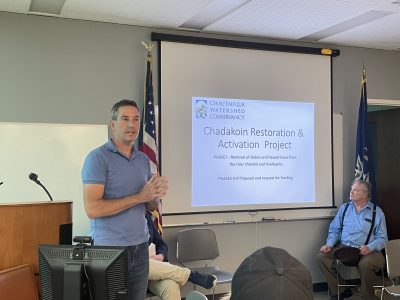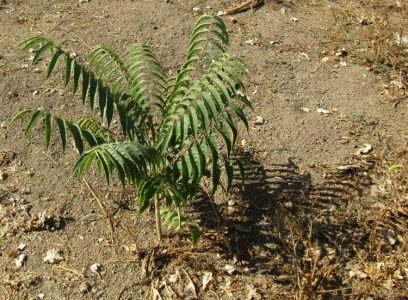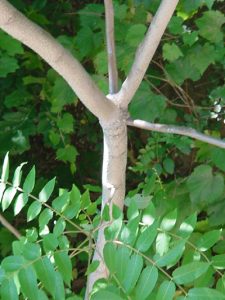Invasive Tree Of Heaven Found Along River In City
- Twan Leenders, Chautauqua Watershed Conservancy ecological restoration manager, is pictured speaking to the Jamestown City Council on Monday. P-J photo by John Whittaker
- Tree of heaven
- Tree of heaven
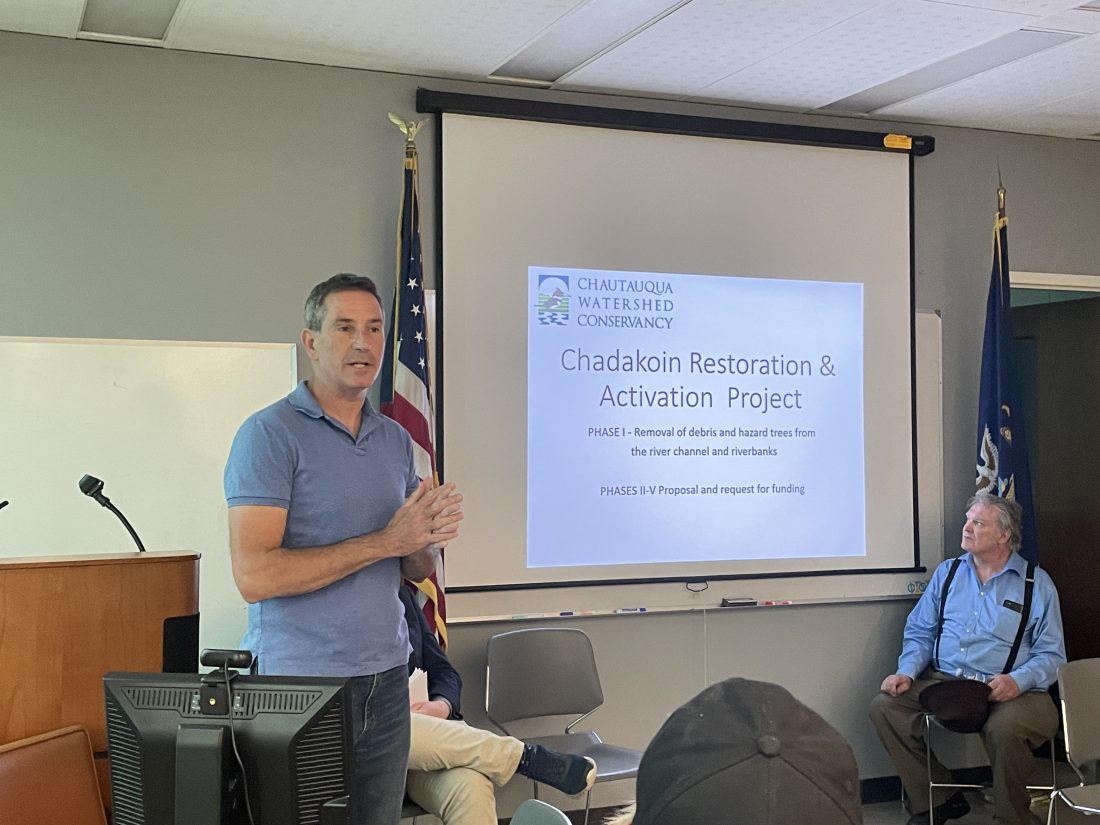
Twan Leenders, Chautauqua Watershed Conservancy ecological restoration manager, is pictured speaking to the Jamestown City Council on Monday. P-J photo by John Whittaker
An invasive species of tree is threatening to take over the banks of the Chadakoin River and, at the same time, attract an invasive species of moth that could devastate the county’s grape industry.
Jamestown City Council members on Monday heard from Twan Leenders, Chautauqua Watershed Conservancy ecological restoration manager, regarding the ongoing cleanup of the Chadakoin River’s banks. Leenders said work has gone well thus far, though the discovery of the Tree of Heaven along the Chadakoin Riverwalk is a concerning development. The worst areas include the river front near the Fireman’s Training Grounds on Harrison Street and behind the Gateway Center on Second Street.
“We’re getting to the point where these core areas are starting to unite,” Leenders said. “If we don’t do anything about this soon all we’re going to have left along the river is tree of heaven.”
According to the state Department of Environmental Conservation, the tree of heaven is the preferred host plant of the spotted lanternfly, an invasive insect being found in more parts of New York that could have severe impacts on the state’s agriculture and forests. Tree of heaven can be identified as its plants and leaflets resemble sumac — smooth around the edges with a small notch at the base, whereas sumac leaflets have jagged edges. When touched or broken, tree of heaven has a unique scent similar to burnt peanut butter.
Tree of heaven secretes a chemical into the ground, Leenders told council members, that help it outcompete native plants for resources. Cutting one down sends stress hormones through the root structure and sends 20 to 40 new shoots for every tree of heaven tree that is cut down. It is possible for the number of tree of heaven plants to double in the next year if nothing is done.
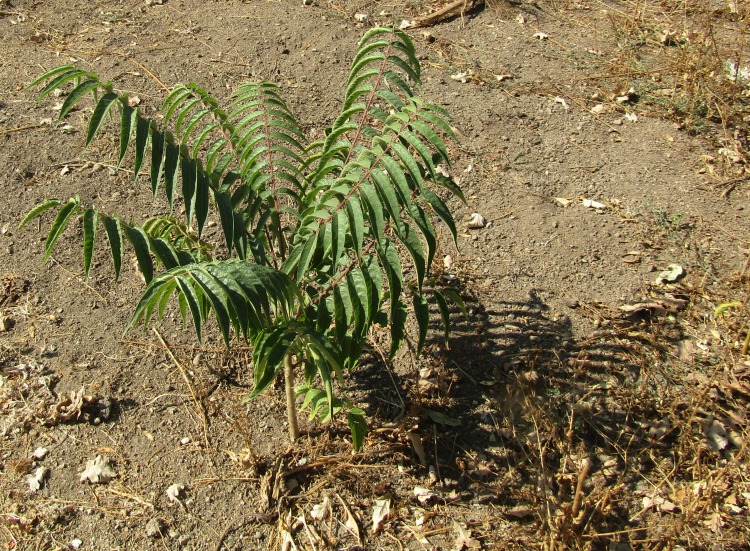
Tree of heaven
Small tree of heaven plants can be dug out, but large plants like the ones found along the Chadakoin River require herbicide treatments at a certain time of the year. The herbicides must be used first in the root system to kill the tree, then it can be cut down.
“Tree of heaven is all along the river right now,” Leenders said. “It came in a long time ago, it was ornamental. It’s in Jamestown and it’s spreading. What I’ve been finding out surveying is we have three core areas where these trees have gotten out of control to the point we almost have a forest land with these trees.”
Leenders and his team have found roughly 120 large tree of heaven trees along the river and another 1,200 sprouts. Work to remove them must happen now through early July, Leenders said, for herbicide treatments to work as intended before the tree’s reproduction cycle is finished. Waiting until after early July to begin herbicide treatments is too late because the tree of heaven will have already dropped its seeds to populate the next generation of the species. Leenders said he is confident acting this year can eradicate the tree of heaven from the Chadakoin River area.
Tree of heaven also attracts the spotted lanternfly, an invasive pest that was first discovered in Pennsylvania in 2014 and has since spread to New Jersey, Delaware, Maryland, Virginia and some areas of New York. It has not yet infested New York the way it has other states. The state DEC reports spotted lanternfly pose a significant threat to New York’s agricultural and forest health. Adults and nymphs use their sucking mouthparts to feed on the sap of more than 70 plant species, which stresses plants, making them vulnerable to disease and attacks from other insects. Spotted lanternfly also excrete large amounts of sticky “honeydew,” which attracts sooty molds that interfere with plant photosynthesis, negatively affecting the growth and fruit yield of plants. New York’s annual yield of apples and grapes has a combined value of $358.4 million, which could be greatly impacted by spotted lanternfly.
Although native insects also secrete honeydew, the size of spotted lanternfly and the large populations that congregate in an area result in large accumulations of the invasive pest. In Pennsylvania, where spotted lanternfly populations are the densest, people can’t be outside without getting honeydew on their hair, clothes, and other belongings, according to the DEC. Leenders said none have yet been found in Jamestown despite the presence of traps he and his crews have found along the river. Jamestown is an early-warning area that has had pesticide applied to the tree of heaven trees so that, if spotted, lanternfly will be killed and fall into the traps if they feed on the trees near the river.
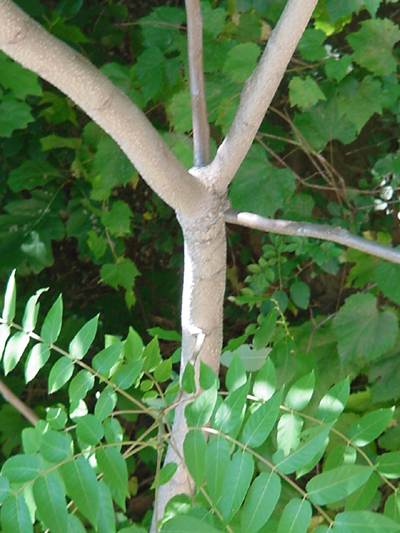
Tree of heaven
Leenders is proposing reprogramming money already approved by the council earlier this year to begin dealing with the tree of heaven infestation while also asking to partner with the Chautauqua County Soil and Water Conservation District to seek out further grants. The city’s existing spending along the Chadakoin River may cover required local matches on the grants, Leenders said. Approval from the state Department of Environmental Conservation and the U.S. Army Corps of Engineers is needed before applying any herbicide due to the plant’s proximity to the Chadakoin River.
“These things are like locusts,” Leenders said. “They just multiply and multiply. … The really bad part of these bugs is they have a strong preference for fruits. Once we get them here the grape industry is going to be in great danger, really grave danger. Agriculture and any type of forestry is going to be in danger. So we have these trees here, in and of themselves they should be removed. But the fact that we have these magnets for spotted lanternfly here and we have a chance to remove them before the bugs get here I think is worth seriously considering.”

